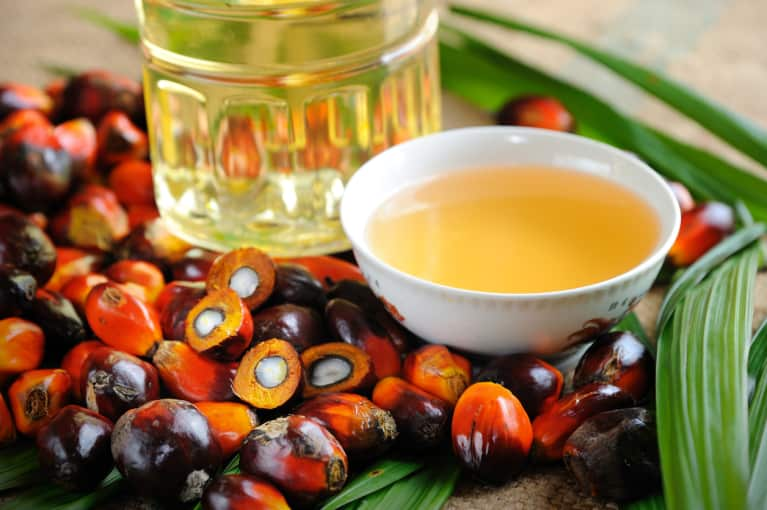Is Palm Oil Healthier Than Coconut Oil? Is It Eco-Friendly? We Asked An Expert All Of Our Burning Questions courtecy;- Liz Moody Liz Moody Food Director
Is Palm Oil Healthier Than Coconut Oil? Is It Eco-Friendly? We Asked An Expert All Of Our Burning Questions courtecy;-
April 22, 2018 — 9:25 AM
Palm oil is one of the more controversial ingredients in healthy cooking—some swear by it for its health benefits and ability to mimic shortening in healthy baking while others think it’s terrible for you and the environment. To get to the bottom of things, we sat down with Neil Blomquist, the managing director ofPalm Done Right™, an international campaign dedicated to educating people about the benefits and consequences of palm oil. Blomquist was formerly president and CEO of Spectrum Organic Products (one of the largest healthy oil companies in the country) and currently also serves as the managing director for Natural Habitats USA.
mbg: First things first—what is palm oil?
NB: Palm is a tropical oil that comes from the fruit of the African oil palm, Elaesis guineensis, one of the two main fruit-bearing tropical palm species (the other being Cocos nucifera, which produces coconuts, and thus coconut oil). Oil palms begin producing fruit once they’re three to four years old yet will continue to grow and produce year-round for up to 40 years.
A plant-based saturated fat, palm oil can be used in a multitude of ways, in cooking, baking, manufactured food, and personal care products. It adds stability, emulsification, and a smooth mouthfeel/texture to products and is a solution for brands and products looking for a clean ingredient profile, without trans fats. Forty percent of the fat content of palm oil is monounsaturated fat, the same fat in olive oil.
A mild carrot-like flavor, with a rich, buttery texture makes unrefined red palm oil the perfect ingredient for many recipes including savory soups and stews, mixed with vegetables or nuts for roasting, and for making light and flaky baked goods, to name a few. The fatty acids in palm oil are very stable and are excellent for medium heat cooking temperatures.
mbg: What are palm oil's nutritional benefits?
NB: Red palm oil has both powerful nutritional and therapeutic properties. Its rich orange color reveals the presence of antioxidant vitamins A and E, in the forms of beta-carotene, rare tocotrienols, and tocopherols of the vitamin E family. Beta-carotene, which converts to vitamin A in humans, provides color to vegetables and fruits such as carrots and tomatoes as well as red palm oil in much higher concentration. Red palm oil also contains at least 10 other carotenes and two forms of vitamin E antioxidants, tocopherols, and tocotrienols.
mbg: There's a lot of controversy about the sustainability practices of harvesting palm oil. Is palm oil bad for the environment?
NB: Palm oil that is not grown sustainably—known as "conflict palm"—wreaks havoc on the environment, animals, and communities and is a focus of many media headlines. The development of large single-crop oil palm plantations has led to clear-cutting primal rain forest in much of the conventional palm industry in Indonesia and Malaysia. These practices displace (or kill) native species—like the Sumatran tiger, the Asian rhinoceros, and the Sumatran orangutan—putting them at high risk for extinction and causing a negative effect on the ecosystem as a whole.
Consumers need to start "saying no" to clear-cutting, burning, or planting in virgin or second-growth rain forests. Instead, they should seek out groups focused on growing palm sustainably. Responsible farmers and smaller plantations with multi-cropping build up degraded land through organic agriculture practices, often on small plots surrounded by other complementary crops while leaving a portion of the land uncultivated to foster biodiversity.
Industrial palm plantations use conventional growing methods with a focus on high volume and low cost. These growers rely on chemical fertilizers, pesticides and herbicides, and heavy machinery for planting and harvesting. This creates a vicious cycle in which fertilizers contaminate water sources, increase the salinity of the soil, and kill off micronutrients, requiring more and more fertilizer for plants to grow.
Not only is this detrimental to the soil and the ecosystem, but more and more evidence is showing that these chemicals have negative effects on our health, too. Groups like Palm Done Right™ support organic and sustainable practices, which means growing without synthetic pesticides, herbicides, or fertilizers.
Sustainable agriculture means nurturing and restoring land. On sustainable farms, agronomists adapt best practices to the landscape. Farmers use green manure and employ cover crops that build healthy soil and attract beneficial insects. Traps made with natural materials control less helpful bugs. This helps regenerate native crops and encourage wildlife.
Good, sustainable farming supports regional communities by working with groups like Fair for Life fair trade funds and partnering with the farmers and members of a community to jointly develop programs that address needs in local communities such as medical support, improving critical local infrastructure, supporting local schools, establishing sources of potable water, nutrition education, to name a few.
mbg: So if we buy sustainable palm oil, is that good for local communities and the environment?
NB: Done right, palm is the highest yielding vegetable oil on the planet, producing five to 10 times more oil per acre compared to other commodity oils (like soybean or canola). If you were to replace palm with soybean, canola, and/or sunflower oil, you would need to increase land use from seven to 10 times to produce the same amount of oil palm oil produces. Choosing sustainable palm oil for food and personal care applications means that less land needs to be used, and if the palm is grown using sustainable practices (100 percent organic, regenerative agriculture, third-party certifications, and social programs), it is extremely beneficial for local communities and the environment. It can help small farms, and when you have social controls in place like fair trade, it puts money back into the communities and schools.
mbg: When we're at the grocery store, how can we know if the palm oil we're buying is sustainable?
NB: It's important to look for palm oil that meets the highest sustainability standards such as certified USDA Organic, Kosher, Non-GMO. As a shopper, look for brands that use organic palm oil like Nutiva, Dr. Bronner’s, Quinn Snacks, La Tortilla Factory, and Good Spread, among others.
OK, but what about coconut oil? Is that actually healthy? We asked some of the top doctors in the country to clear up some rumors.



মন্তব্যসমূহ
একটি মন্তব্য পোস্ট করুন